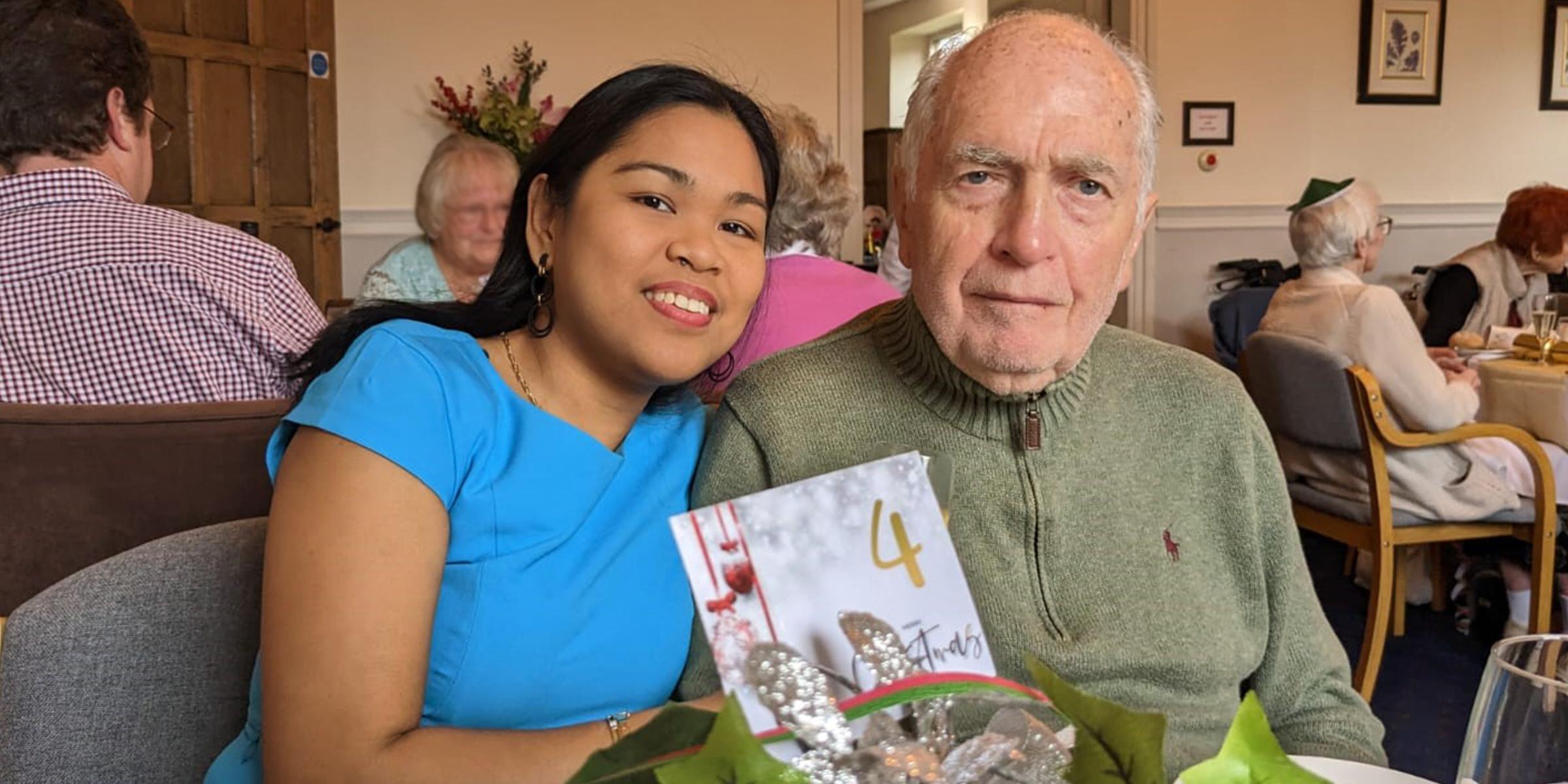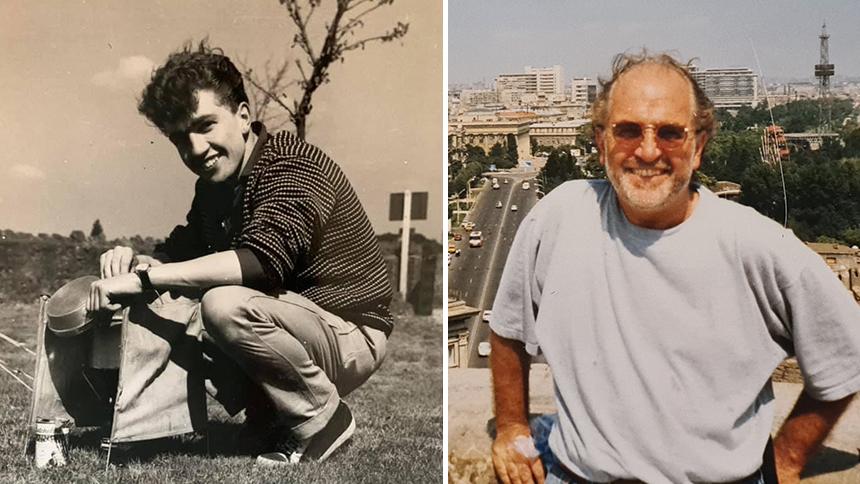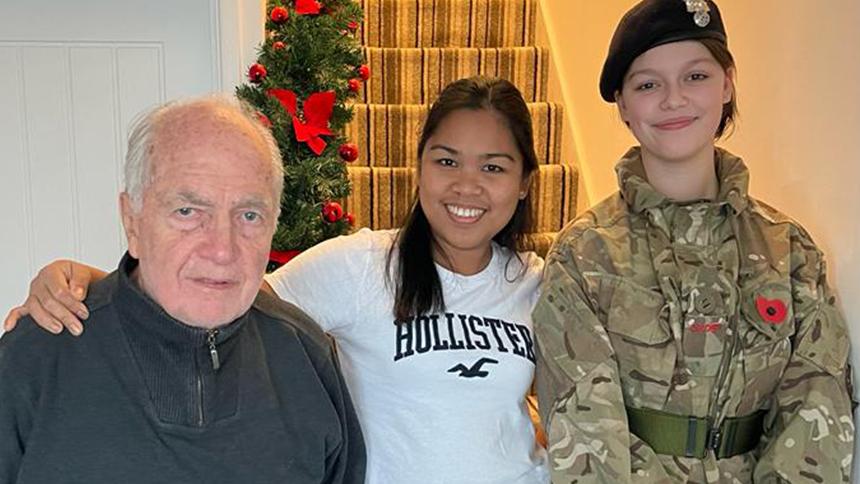
Talking to others and going to groups helps me to support my husband who has Alzheimer’s disease
Daisy Timms shares how speaking openly and keeping in touch with people helps her to support her husband Roy, who has Alzheimer’s disease.
Daisy Timms lives in Southampton with her husband Roy. They have settled in the city but used to travel a lot for work.
Daisy moved a long way from home to be with Roy.
‘I’m from the Philippines originally,’ she says. ‘Traditionally we have very close-knit families, but my family are all back home.’
The couple met in 2013 while working for an oil and gas company in Abu Dhabi, one of the United Arab Emirates.
‘I worked there for seven years doing admin jobs,’ Daisy recalls.
‘Then I met Roy, who had been posted from Malaysia. His job was to look for new projects in the Middle East and I became his assistant.’
Daisy says Roy was a perfect gentleman and they got on really well.
I hadn’t met anyone as kind and supportive as Roy before.
‘I refused him in the beginning, partly because of our age gap, but he was so sad after that. So, we decided to give it a go!’
Life together
After Abu Dhabi, Roy went on to different job postings – including one in Eastern Europe – and Daisy joined him.
The pair have been together ever since, and Daisy says they rarely argue.
‘He is such a gentle soul and never argues, even though sometimes I am not in the right mood.’
Roy is originally from Northampton and has three children in the UK, though he moved around a lot for work.
The couple worked in Georgia for a year before settling in the UK in 2016. Roy retired shortly afterwards.
‘We went out together as much as we could and travelled a lot, never settling in one place,’ Daisy says.
We came to Southampton mostly because of Roy’s family and his boat. He had a yacht before and loved working on it.
‘I also found a job as a receptionist here.’

Changing plans
While working on his boat, Roy started to struggle with some tasks.
This was unusual, as he has an engineering background and was always very capable at DIY projects.
Then he started to forget things and lose his keys.
Daisy says, ‘He would get frustrated because he couldn’t coordinate what he wanted to do in his mind.
One day he said, “Darling I think something is wrong.”
‘We went to the GP and told them everything. We were referred and got a diagnosis almost straight away.’
Roy was diagnosed with Alzheimer’s disease in 2019.
Travel plans and wishes for Roy’s retirement have been put on hold.
‘Our long-term plan was to move to the Philippines,’ Daisy says, ‘but we had to change that.’
There’s so many things that he wants to do. Alzheimer’s has stolen a lot of time from us.
‘We did go on one cruise to the Mediterranean which was lovely and travelled to Italy, where we met Roy’s old friends again.
‘It’s difficult to travel now because Roy uses a wheelchair and other mobility equipment.
‘This is not what we planned but this is what we’ve got to work with.’

Missing signs
Looking back, Daisy realises that some of the things Roy was doing could have been signs of Alzheimer’s, though she did not know this at the time.
Things like forgetting his keys were put down to Roy’s age – he is now 84.
Now that I know what dementia is, I realise that forgetting things and struggling to find the words to describe what was wrong were signs.
‘He was having problems for quite some time after we met and in his last job.’
In 2020, around the start of the pandemic, Roy struggled with being alone and not being able to go out.
Daisy quit her job, as balancing care and work became too much.
She sometimes worries she won’t be able to find employment later on due to taking time out.
‘I’m young and I worry I won’t be able to get back into work because the market is so competitive,’ she says.
‘I had to balance this from a financial perspective as well.
‘Why go to work and pay for someone to care for him when I could do it myself?
‘Sometimes you have to make that difficult choice.’
Emotionally challenging
Daisy has taken on a lot of the daily tasks Roy used to do independently, which she says can be emotionally challenging.
‘It’s a real struggle,’ she says.
Roy is losing his abilities and is not able to make conversation anymore, which can be lonely.
Finding residential care for Roy is a possibility, but Daisy says she would feel guilty about moving him away from his home.
‘I couldn’t even consider it,’ she says. ‘He’s a good man and he deserves to be looked after in his own home with undivided attention.
‘Sometimes I have to take myself out of the situation and have a cry. But I don’t let Roy see it – it wouldn’t help him or me.
‘If I didn’t do this, we would both get frustrated and argue. I pick myself up again and carry on, but it’s hard.’
Daisy says Roy’s kind and calm personality ‘still shines through’.
Moving to a bungalow last year has also helped him to get around their home more easily.

Speaking out
Speaking with others about the challenges of caring is important to Daisy.
She speaks to her family in the Philippines almost every day and has found a support network of fellow carers and churchgoers in Southampton.
They often support each other by calling and visiting.
It’s a good feeling when people remember you. Before I had this, I was struggling a lot.
‘We used to go to a lot of groups for people with dementia and other community groups,’ Daisy says.
‘But quite a lot of them were in the morning so, by the time we had gotten ready, I was already exhausted.
‘We do still go to one and it’s great because we feel like one family there.’
Stigma
Roy was reluctant to tell old colleagues and friends about his diagnosis due to the stigma that still surrounds dementia.
‘I did my best to respect Roy’s wishes,’ Daisy says, ‘but when his old friend saw him, they wished we had told them about his Alzheimer’s.’
One particular incident knocked Roy’s confidence.
He was shopping alone and pushed into the queue without realising. Another shopper then shouted at Roy, who was confused.
Since then, Roy doesn’t go out on his own.
‘He was really upset,’ Daisy recalls. ‘He was only trying to be independent.’
Following these experiences, Daisy wants everyone affected by dementia to talk about it more.
She says, ‘When you’re open with family and friends, you will be surprised how much support you can get.
I want everyone to try to talk. Don’t stop trying even if you get rejected – there are a lot of understanding people out there.
Roy and Daisy have since volunteered for the Society’s Time for Dementia programme, which links people affected by dementia with healthcare students.
Through a series of visits, the students learn about the realities of living with dementia so they can provide better care in the future.
Daisy hopes this will lead to a society more accepting of people with dementia, and recognition that dementia affects everybody differently.
‘My goal is to help raise awareness – especially with the younger generation,’ she says.
‘People just don’t know and that’s why the stigma is still there.’
Accepting help
Thanks to support from family members and other carers, Daisy has been able to take better care of herself and Roy.
‘Some people can be quick to judge because of the age gap between us,’ she says.
‘But once they get to know me, they say, “Hats off to you for what you do.”
‘To me, it’s my duty to my husband – we made a vow to each other when we got married.
As a carer, you have to know when to accept help. Without that you just keep going, and there’s a breaking point. I have very good support.
Donate
Your donation funds programmes like Time for Dementia, which links Daisy, Roy and others with professionals of the future.


